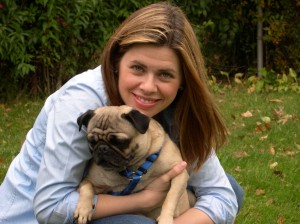Creature Feature
Obesity isn’t just a People Problem
By Stephanie Karpf, DVM
“He isn’t fat, he is big boned.”
“She is just always so hungry!! She looks at me with those eyes…and I just can’t say no!”
“He really isn’t much heavier than my other dogs. I think that because he exercises, he is just really muscular.”
“I don’t ever give her anything extra. It is my husband’s fault!”
“It’s mostly fur…really.”
Really? I have heard so many excuses for obese pets, and they continue to get more and more interesting with time. The sad truth is that our pets are getting fatter. And it isn’t their fault. It is ours.
Unlike their human friends, our pets do not have any control over their own weight. We control exactly how much food they are given each day. So, when our dogs and cats start to tip the scale, it is because we are the ones guilty of overfeeding them.
When feeding your dog or cat, it is important to actually measure the amount of food you are giving. This is important so that you know exactly what is going in…so that if your dog is still gaining weight, you know how much to cut back. It is not enough to “eyeball” the measurement, or use nonstandard amounts like “a handful.” Get in the habit of keeping a plastic measuring cup in with your bag of dog or cat food, and measuring out the exact amount of food, every time.
It is best to ask your veterinarian for a recommendation on exactly how much your dog or cat needs to be eating. Although the bag of food will come with instructions on how much to feed, this is typically too high. It is important to remember that the pet food companies are in the business of selling pet food. Therefore, it is in their best interest for your pet to eat more of their product. The true amount of food needed, is often less than the recommendation that is on the bag.
For cats, especially, one of the major contributors to obesity is ad lib feeding. This is when people just continuously fill and refill the food dish with dry kibble all day long. This is most often a problem in households with multiple cats. Ad lib feeding is just not healthy for cats. It is better to feed them controlled amounts of dry food, or better yet, canned food that is only offered at specific feeding times (usually twice per day).
Another major contributor to pet obesity is lack of exercise. In our busy lifestyles, we often don’t find the time to take our dogs on long walks. We would rather just come home from work, and rest on the couch. But we really owe it to them to get them out for some exercise. It is healthier for dogs both physically, and mentally to go on at least two long walks per day. This has the added benefit of being good for us as well!
Cats also need exercise. Most people feel that their cats are content to just lay around all day, but really, cats should be exercised. In the wild, cats would spend a large part of their day hunting. These types of activities can be replicated at home with various different types of cat toys designed to encourage a cat to stalk prey. You can do this with “fishing pole” type toys that have feathers or little mice on the end. You can also play with a cat by encouraging them to chase the little red dot produced by a laser pointer.
If you feel that your dog or cat is overweight, please take them in to your vet for an examination, and for advice on how to go about a safe and effective weight loss program. As is true for people, pets do best when they lose their extra pounds very slowly and gradually. Your vet can set you up with a concise diet and exercise program designed to help your pet reach a more healthy body size.
Dr. Karpf is the co-owner of The Visiting Vet, a housecall service for dogs and cats serving Palm Beach County. For an appointment, please call 561-252-8874.

